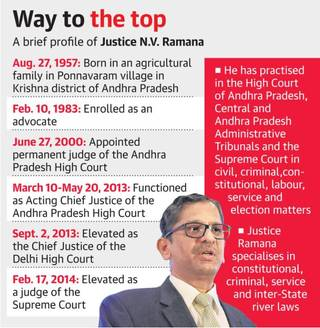
In News
Recently, the Chief Justice of India (CJI) Sharad A. Bobde has recommended Justice N.V. Ramana, the senior-most judge of the Supreme Court (SC), who is set to take over as the 48th CJI from 24th April 2021.
About Justice Ramana

Appointment of Chief Justice
- The CJI and the Judges of the SC are appointed by the President under clause (2) of Article 124 of the Constitution.
- From 1950 to 1973, the practice has been to appoint the senior most judge of the SC as the CJI.
- This established convention was violated in 1973 when A N Ray was appointed as the Chief Justice of India by superseding three senior judges.
- Again in 1977, M U Beg was appointed as the chief justice of India by superseding the then senior-most judge.
- This discretion of the government was curtailed by the SC in the Second Judges Case (1993), in which the SC ruled that the senior most judge should alone be appointed to the office of the CJI.
Appointment of Judges
- The other judges are appointed by the President after consultation with the CJI and other judges of the SC and the HCs as he deems necessary.
- The consultation with the CJI is obligatory in the case of the appointment of a judge other than CJI.
Qualifications of Judges
- Should be a citizen of India.
- Should have been a judge of an HC (or HCs in succession) for five years.
- Should have been an advocate of an HC (or HCs in succession) for ten years.
- Should be a distinguished jurist in the opinion of the President.
- The Constitution has not prescribed minimum age for appointment as a judge of the SC.
Oath or Affirmation
- A person appointed as a judge of the SC has to make and subscribe an oath or affirmation before the President, or some person appointed by him for this purpose.
- In the oath, a judge swears to:
- Bear true faith and allegiance to the Constitution of India.
- Uphold the sovereignty and integrity of India.
- Duly and faithfully and to the best of his ability, knowledge and judgement perform the duties of the Office without fear or favour, affection or ill-will.
- Uphold the Constitution and the laws.
Tenure of Judges
- The Constitution has not fixed the tenure of a judge of the SC.
- However, it makes the following three provisions in this regard:
- Holds office until he/she attains the age of 65 years.
- Any question regarding the age is to be determined by such authority and in such manner as provided by Parliament.
- Can resign the office by writing to the President.
- Can be removed from his office by the President on the recommendation of the Parliament.
- Holds office until he/she attains the age of 65 years.
Removal of Judges
- A judge of the SC can be removed from office by an order of the President.
- The President can issue the removal order only after an address by Parliament has been presented in the same session for such removal.
- The address must be supported by a special majority of each House of Parliament.
- Grounds of Removal: Proved misbehaviour or Incapacity.
- The Judges Enquiry Act, 1968 regulates the procedure relating to the removal of a judge of the SC by the process of impeachment.
- No judge of the SC has been impeached so far.
- Impeachment motions of Justice V Ramaswami (1991–1993) and Justice Dipak Misra (2017-18) were defeated in the Parliament.
Salaries and Allowances
- Salaries, allowances, privileges, leave and pension of the judges of the SC are determined from time to time by the Parliament.
- They cannot be varied to their disadvantage after their appointment except during a financial emergency.
Acting CJI
- The President can appoint a judge of the SC as an acting CJI if:
- Office of CJI is vacant.
- CJI is temporarily absent.
- CJI is unable to perform the duties of the office.
|
Second Judge Case
|
Source: TH
Next article
Facts in News